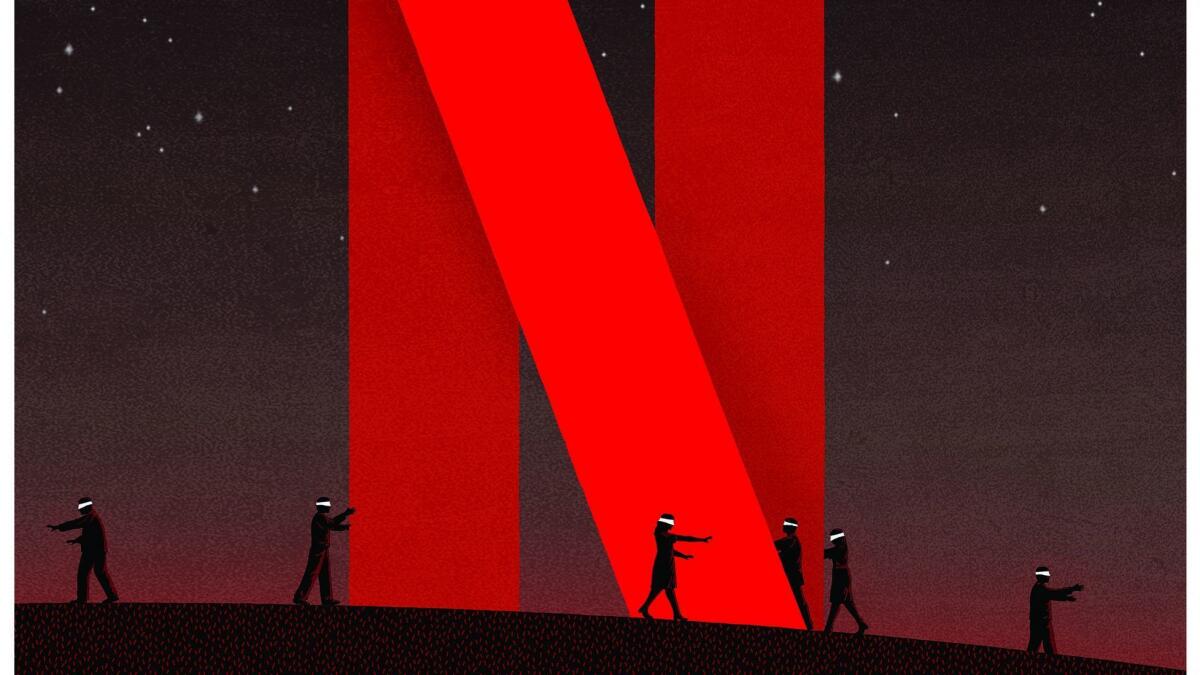Netflix plays peekaboo with its ratings. Hollywood isn’t amused

When it comes to ratings, Netflix treats the public and many of its business partners like the characters in “Bird Box” — blindfolded and left to feel their way through the dark, except for a rare glimpse of light.
Secrecy is a charge often leveled at Netflix. In Hollywood, where TV ratings and box-office stats are the lifeblood of business, the streaming entertainment titan plays by its own rules, keeping its viewer statistics out of sight and making it difficult for outsiders to measure the success of its shows.
Recently, though, Netflix has publicly revealed some fuzzy performance figures for a handful of projects, among them the former Lifetime series “You,” the Spanish-language teen drama “Elite” and most prominently the science fiction thriller “Bird Box,” which the company said had been seen by more than 45 million accounts in its first week. But these are the exceptions. Viewership for Netflix’s hundreds of other original series and movies remains a corporate secret.
As Netflix continues to grow, this game of peekaboo has become increasingly irksome to other studios as well as talent agencies, some of which feel that Netflix’s lack of transparency gives it an unfair competitive advantage.
Despite pressure on Netflix to disclose more data, experts say Netflix has little motivation to be more open, in part because it doesn’t answer to advertisers who would normally demand such information.
“Netflix frankly doesn’t have to tell anybody anything about the viewing of any of their stuff because they don’t have to,” says Tim Hanlon, chief executive of the Chicago-based media advisory and investment firm the Vertere Group.
Netflix also faces rising costs associated with content licensed from other studios, and disclosing ratings on popular shows would likely lead to even higher licensing fees.
Older favorites like “Friends,” “The Office” and “Breaking Bad” are major draws for Netflix subscribers and continue to bring in big business. Netflix recently paid more than $100 million to Warner Bros. to retain the exclusive streaming rights to “Friends” for an additional year, more than three times what it had previously paid.
“Releasing data would make things worse for Netflix. It needs to protect the data so it can negotiate better deals,” says another industry analyst, speaking on condition of anonymity due to a previous working relationship with the company. “For them, to use and own their data is a religion.”
Netflix declined to comment for this story. The Los Gatos, Calif.-based company uses the viewing habits collected from its 139 million subscribers worldwide to make viewing recommendations in the Netflix app, often steering viewers to its own original content.
It also scours data to make cancellation and renewal decisions.
“Every quarter we look at the trends,” Netflix’s outgoing Chief Financial Officer David Wells said in a 2017 earnings call. “For us, [it] is about the sort of continuity of viewing over the life of the show.”
Companies that license shows to Netflix receive some basic viewership data, but executives say the information isn’t useful.
“We get a compilation of views by season, so it’s not divided out by episode, and there’s no indication of what a view even means — like how long the duration,” says one network executive who wasn’t authorized to discuss the matter publicly. “From an analysis standpoint, it’s meaningless.”
Netflix also declines to provide stats on how its other offerings perform, making comparisons impossible.
“There is no context to it. You only know about your [own programs],” says another TV executive who has done business with Netflix. The executive says Netflix doesn’t provide any demographic information about viewers.
One independent film distributor that licenses movies to Netflix says it receives no statistics at all about its titles.
Netflix also doesn’t publicly reveal box office figures for the handful of prestige movies that it releases in cinemas, among them “Roma,” which on Tuesday received 10 Oscar nominations, including the streamer’s first best picture nod, and “The Ballad of Buster Scruggs,” which received three. The choice to not release ticket sales was made by Netflix, not the theater owners, according to a person with knowledge of the situation.
As Netflix courts more A-list Hollywood talent, there has been internal debate over how much box office data to release. Amazon Studios publishes grosses for its movies, which are released theatrically before they are streamed on Prime Video.
When Netflix makes a rare public data disclosure, it has faced skepticism.
“Took off my blindfold this morning to discover that 45,037,125 Netflix accounts have already watched Bird Box — best first 7 days ever for a Netflix film!” the company said last month on its official Twitter account.
The social media pushback was swift. Netflix didn’t say how many of those 45 million had streamed the whole movie, or which countries saw the most views. Nor has it published comparable data on other star-driven features like “Bright,” starring Will Smith, which was released a year ago.
Netflix said during its recent fourth-quarter report that “Bird Box,” starring Sandra Bullock, was now on track to be seen by 80 million households, but it didn’t elaborate. The earnings call was notable for publicizing data about some of its series — “You” has been seen by 40 million households while the Spanish-language “Elite” has attracted more than 20 million households in four weeks.
“I would look at it like these are less financial metrics as they are cultural metric[s],” Netflix chief content officer Ted Sarandos said during the earnings call. “I think it’s important for artists to understand — to have the audience also understand the size of the reach of their work. So that’s why you’ll see us ramping up a little bit more and more and giving out — sharing a little more of that information.”
But so far, the vague and irregular nature of Netflix’s disclosures has bred distrust.
“No one can verify their claims,” says Adam Candeub, a professor at Michigan State University’s College of Law, where he specializes in intellectual property. He says Netflix behaves less like a studio and more like a Silicon Valley giant like Google or Facebook, both of which have faced scrutiny for the way they collect and use consumer information.
“That’s the interesting dilemma about the information economy when you have these dominating firms using market data,” Candeub says.
Netflix didn’t invent the manipulation of data when it selectively leaked the “Bird Box” figure. During the 1980s and ’90s, it was common for the then-emerging cable industry to tout its growth by comparing the audience share of dozens of cable channels with that of major broadcast networks. Media reports highlighted the erosion of the broad audience.
During its first two decades, HBO remained above the fray in the daily Nielsen ratings dogfight the broadcast networks engaged in.
As a premium cable service not dependent on advertising, HBO rarely touted ratings. But that changed once it started turning out big original series such as “Sex and the City” and “The Sopranos,” which drew an average of 18.2 million viewers during its heyday in 2002.
The ratings signaled that an HBO subscription was a must-have and that the network could reach a mass audience.
Netflix is happy to lift the veil of secrecy for some prominent talent, though not all of them.
One actor with a Netflix series says he receives data on how many accounts have seen each season of his show, how each episode fared and how well the show has performed over time. “It’s very detailed information,” says the actor, who spoke on condition of anonymity, citing a non-disclosure agreement with Netflix.
Actress Maggie Gyllenhaal told The Times in November that Netflix shared viewer stats with her for the movie “The Kindergarten Teacher.” “There’s no universe in which even a fraction of that number of people would have seen this movie [in theaters],” she said.

Maggie Gyllenhaal sheds light on working with the notoriously secretive streaming platform, the numbers she’s been given by Netflix and why she thinks the company could be a game-changer for arthouse films. “I think Netflix is like the Medicis,” she
But the executive producers on Netflix’s “One Day at a Time” — including legendary producer Norman Lear — don’t receive any analytics corresponding to viewership, according to two people close to Lear. The Sony-produced show is releasing its third season on Feb. 8, but it’s unclear whether it will be renewed for a fourth.
Actors and other talent don’t receive traditional residual payments, like those associated with syndicated series, from Netflix shows, but the company pays bonuses when one of its series or movies performs well, according to two people who have negotiated deals with the company. So far, major talent guilds have not raised a ruckus over Netflix’s payment practices or the lack of transparency, in part because Netflix pays competitive rates and has provided new creative opportunities.
Nonetheless, for talent agents, negotiating compensation for clients on a Netflix title can be difficult because of the limited amount of available data out there.
“I’m at a disadvantage for sure,” says one executive at a leading Hollywood agency. “Things that typically give an agent leverage I don’t have.”
To fill the data gap, Nielsen and other research firms have developed an industry of guesstimating Netflix viewership and trends through their own proprietary methods, often relying on sampling. These firms then sell their reports to studios, networks and agencies.
“Media companies are buying information from us year after year,” says Roseanne Luth, founder and president of San Diego-based Luth Research, which tracks Netflix viewing habits along with other online usage data.
Nielsen measures Netflix viewing data through a panel of consumers used to collect ratings for TV channels.The Nielsen box picks up the audio cues of Netflix programming . Nielsen didn’t respond to requests for comment.
Netflix has publicly disparaged the research published by these firms. When NBC presented research from Symphony Advanced Media during a Television Critics Assn. conference in 2016, Sarandos called the findings “inaccurate.” The data included viewer stats for shows including “Orange Is the New Black” and “Jessica Jones.”
“The Netflix people were very quick to denigrate it,” recalls Charles Buchwalter, the former president and CEO of Symphony. They “were very aggressive explaining why our approach didn’t make any sense. If they disagreed, why didn’t they share their numbers? We noticed they never did this.”
Symphony eventually went out of business. “We felt like we were a thorn in their side,” he says, “but other than that, we just kept doing it.”
Experts believe Netflix will become more transparent only if it launches an ad-supported version of its service, like Hulu has done.
Santa Monica-based Hulu provides viewing data to its program suppliers, three of which are their owners, Fox, Disney and NBCUniversal.
But Netflix has given no indication that it’s moving in the ad-supported direction, and industry observers say it is unlikely in the near future that the company will become more open about its ratings.
“Short term, I don’t think so,” says Christopher Spicer, a partner at Akin Gump, where he heads the firm’s entertainment and media practice. “Long term, if reporting becomes systemic among other streaming providers, then potentially it will.”
More to Read
Inside the business of entertainment
The Wide Shot brings you news, analysis and insights on everything from streaming wars to production — and what it all means for the future.
You may occasionally receive promotional content from the Los Angeles Times.












